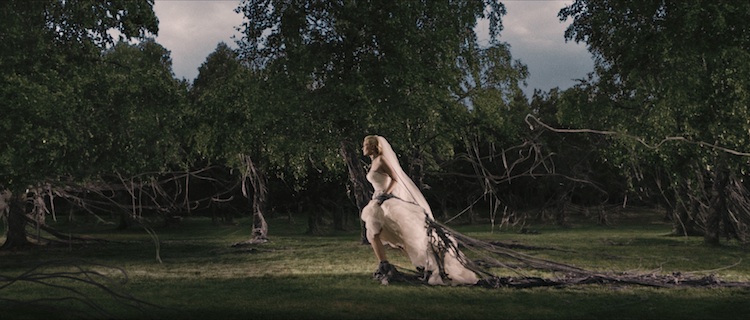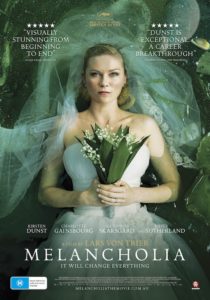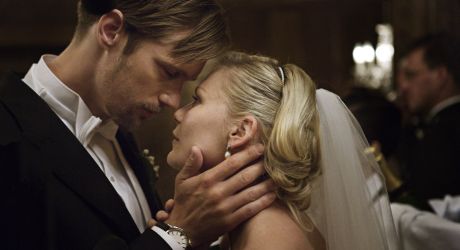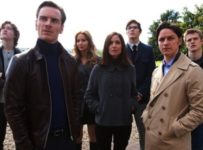Director: Lars Von Trier
Runtime: 130 minutes
Starring: Kirsten Dunst, Charlotte Gainsbourg, Kiefer Sutherland
Distributor: Madman
Country: Denmark
Rating: Certified Bitstastic (?)
Lars Von Trier is a like him or hate him prospect for audiences and critics alike. Those in the former camp have loved the harsh originality of Breaking the Waves, the dark musical fantasy of Dancer in the Dark or the compelling audacity of Dogville. For others, he will simply be the fool behind The Idiots and the misfire Manderlay. The latter cohort was not persuaded by his very public comments that appeared to support Nazis at a Cannes Film Festival press conference earlier this year, with the festival instantly declaring him persona non grata and damaging the publicity for his latest film Melancholia. This is the greatest shame of all, for it may be Von Trier’s first great masterpiece.
As Justine (Kirsten Dunst) marries Michael (Alexander Skarsgård) at a lavish wedding at her sister Claire’s (Charlotte Gainsbourg) stately home, tensions between the sisters and the family emerge. Claire’s husband John (Kiefer Sutherland) makes his contempt for Justine obvious, and her frequent bouts of depression do not engender any warm feelings from him. Claire attempts to hold it together, but the wedding is a disaster. Meanwhile, a mysterious blue planet known as Melancholia approaches the Earth, producing erratic behaviour in everyone.
The slow-motion opening sequence, in which Justine sluggishly runs with feet bound by roots and earth, and two planets collide in a spectacular display of effects, acts as an interesting mirror image to Terrence Malick’s The Tree of Life which also debuted around the same time as Melancholia. If Malick was recreating the origins of everything, Von Trier’s opening is the end of all things. The eight-minute sequence is not simply the most visually arresting that Von Trier has ever been, with the filmmaker seemingly liberated from the shackles of his self-imposed rules of the last few decades, but also one of the most breathtaking sequences in the history of the medium. Although Von Trier almost immediately returns to the familiar handheld “shaky cam” that has characterised the majority of his films, particularly throughout the wedding sequences, the shadow of this jaw-dropping opening is cast over the entire film, setting the tone for even those scenes where Melancholia is not a primary focus.
Melancholia is a film in two parts. The first, simply labelled Justine, focuses on the awkwardness of the wedding. The feel is not dissimilar to Von Trier’s earlier Festen, with the floating camera catching the intimate and banal moments with equal sincerity. The film drifts in and out of the house, as if in a dream, with early indications that there is something otherworldly afoot. Justine behaves in a wildly bratty manner in the first half of the film, leaving the party as she pleases, having regular sulking fits and treating her own wedding with the kind of casual flippancy that one would of somebody else’s garden party. Yet it rapidly becomes obvious that, like a great Dane before her, something is rotten in the stately manor. Seemingly surrounded by idiots and opportunists, her mother (Charlotte Rampling) takes every opportunity to belittle her, her advertising executive boss (Stellan Skarsgård) attempts to extract a campaign slogan from her and her father is simply a lost man. “I smile and I smile and I smile”, she says, but her sister sees straight through it. “You’re lying to all of us”.
One of the weightier themes in this first half of the film is that of depression, and as we move into the second part (labelled “Claire”) the significance of the rogue planet Melancholia takes on a dual meaning. “Melancholia is just going to pass right in front of us,” predicts Sutherland’s character. “And it is going to be the most beautiful sight”. We already know the fate of the planets from the opening sequence, so the inevitability of the scenario instantly gives us a dual meaning to this statement. He could just as easily be referring to Justine, who begins to transform from a deadened-limbed character stricken with chronic depression to someone suddenly awakened, just as Claire begins to act as irrationally as Justine was during the wedding. Melancholia is at the height of its narrative strength in this back half of the film, but all of the parts work together to form a cohesive whole.
Dunst, who won Best Actress at the Cannes Film Festival earlier this year, is at her finest as Justine. Transitioning from her flighty happiness of her introductory scenes, through petulance, paralytic depression and ultimately enlightenment. We have seen Dunst in a variety of roles, from The Virgin Suicides to blockbusters such as Spider-man, and she draws on them all here. The seasoned Gainsbourg is initially depicted as the exemplar of normalcy in the film, but she too is able to flip on a dime and give us sustained neurotic angst.
Melancholia is undoubtedly a beautiful film, but filtered through the eyes of someone who does not see the world in this way. “The Earth is evil. We don’t need to grieve for it. Nobody will miss it, ” remarks Justine, but that could be Von Trier’s voice as well. Like all things Von Trier, this will undoubtedly divide audiences straight down the middle. Combining the grand romanticism of the Wagnerian score, Von Trier isn’t so much celebrating the beauty of the Earth as welcoming its imminent destruction.

Melancholia will be released on 15 December 2011 in Australia from Madman Films.






